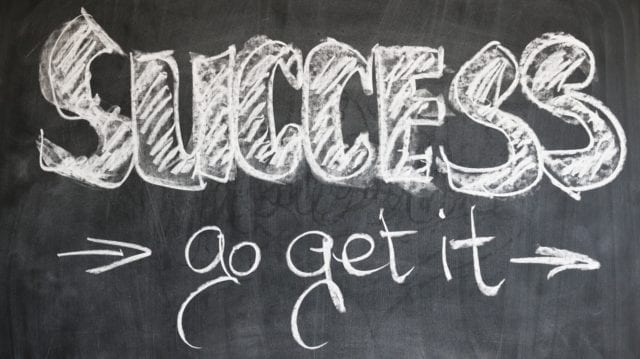
Keys To Success: Use cognitive skills to reach your goals
What is success? Is it a college degree? Getting hired for your dream job? Finally, securing financial stability? Or is success about thriving relationships, connecting with your inner self, or finding happiness? Success is something we all strive for, but do not always know the best way to obtain it. Keep reading to discover the keys to success, as well as the underlying cognitive skills you can apply to reach your version of success!

What is Success?
Success is the achievement of set goals and desired objectives. The term “success” is ambiguous—open to more than one interpretation—being that each individual possesses unique aspirations. While some endeavor to earn a six-figure salary and rank high in social status, others are content with a few strong relationships and a meager salary at a job they are passionate about. Neither version of success is wrong. Defining the concept of success simply depends if you meet your personal goals.
Why is Success Important?
Success is important because if done properly, it contributes a sense of well-being. Reaching your view of success brings happiness, fulfillment, and increases confidence. You know that if you were successful in achieving your goals despite the obstacles, you are equally capable of tackling whatever you set your mind to in the future. However, following another’s version of success is counterproductive. You cannot feel satisfied aspiring towards goals that are not your own expectations. Still, success can facilitate outside success. Accomplishing your aspired intentions benefits the productivity of businesses and the economy, which can inspire others to seek their own keys to success.
Keys To Success: Have Goals
The beginning key to success is to formulate realistic goals. Having a goal provides you with direction. You cannot “achieve” your desired outcome unless you know what it is you wish for in the first place.
Outline your goal(s). Write them down. Visualizing your goals on paper allows you to brainstorm how to go about achieving them. From there, you can divide the main goal into smaller, short-term goals, to increase your chance of success.
When mapping your goals:
- Ask yourself, What are your values and priorities?”—Your inner beliefs are a guide through the decision-making process.
- Consider your skills—What are you good at? What skills have proven beneficial in previous jobs?
- Keep your goals realistic—While it’s important to aim high, you will eventually become burned out or discouraged if you create unrealistic goals.
- Research—Have others been successful at your goal? How did they accomplish this? Learning from their mistakes may make reaching your goal easier.
Keys To Success: Strengthen Cognitive Skills
Now that you have a goal, you must framework each step necessary to successfully meet that goal. The complex thinking involved in doing requires cognitive skills. Cognitive skills are a set of higher-order thinking processes that allow us to reason, pay attention, learn, and remember. They are the skills we use to make sense of the world around us and to complete tasks with problem-solving. Cognitive skills are the keys to success because being successful entails overcoming problems and analyzing our environment.
Memory
There are multiple types of memory, but working memory is the most crucial key to success. Working memory is a form of short-term memory designed to temporarily hold the information we see and hear for our brain to work with it. Only a few pieces of information are stored in working memory at any given time. Remembering the digits of a phone number long enough to make a call is a prime example. Working memory is comparable to a mental sticky note. The process of working memory also assists in organizing information for long-term use if deemed important.
To be successful, working memory is imperative. You must recall information to meet your goals. Brain training games, like those offered by CogniFit, are great resources to strengthen working memory.
Attention
Attention describes the ability to selectively choose to focus on relevant stimuli in the environment and respond to it, while intentionally ignoring irrelevant stimuli. The cognitive skill of attention relied on our level of alertness, the amount of time we can attend to a stimulus, and the ability to alternate attention between multiple stimuli. Success demands attention because you need to focus in order to create and attain your goals. A tip to improve your attention span is to limit distractions in the room when working. This includes a cell phone or television.
Logic and Reasoning
Logic is the step-by-step method of problem-solving, whereas reasoning is abstract thought in which we deduct conclusions from premises. Together, logic and reasoning lead to using information for concept formation and problem-solving. These two cognitive skills are strengthened through stimulating the mind by trying new activities and hobbies. Because of logic and reasoning, you can think innovatively about your goals to become successful.
Processing
You easily visualize vivid representations as you conjure your inner thoughts, right? That is visual processing—the ability to think in images. Processing occurs with sound too. Auditory processing is blending and segmenting sound. Processing is also how we respond to the information we receive. Arriving at success calls for imagining what goals you seek to be successful at, along with the actions required (i.e. the response).
Keys To Success: Possess Confidence
Confidence is believing in your power to succeed. It really is the key to success because of the belief in your own abilities drives your actions. Ruminating on the ways in which you may fail or putting yourself down is a form of self-sabotage that confidence counteracts. If you possess confidence, you are more likely to pursue opportunities for success out of your comfort zone. Recent Princeton University research on mathematicians revealed that those who were confident in their numeric abilities had better financial outcomes and fewer instances of disease.
Keys To Success: Mindfulness
Mindfulness is maintaining awareness of your thoughts, feelings, and physical sensations in the present. It is the state of accepting current experiences without judging them as good or bad. Mindfulness is developed through meditation training. During mindfulness meditation, the intention is to focus on breathing. As distracting thoughts enter your mind, you simply reroute your thoughts back to your breathing and do not attend to them. Mindfulness is important for success because it cultivates self-awareness, which is crucial to prevent biases and opinions from impacting decision-making.
Keys To Success: Connect with Values and Spirituality
Values are fundamental beliefs that motivate behavior. They are how we establish what is desirable so that we can generate a vision of how we want to be successful and what we have to do to get there without compromising our standards. Your values are sourced from your inner-core and spirit—who you are as a person. Studies of college studies indicate that spirituality provided students with a life purpose, thereby reassuring students of their academic plans and provided an ability to overcome barriers (Wood & Hilton, 2012). As you connect with your values and spirituality, you live an authentically honest life and are more likely to take responsibility for your thoughts and behavior, as well as having a matured sense of self-esteem.
Values and spirituality differ from individual to individual. For some, values are rooted in their religion (i.e. Christianity, Islam, Buddhism, etc.). But religion is not the sole form of spirituality. Prayer and are great, yet practicing environmentalism, humanism, or volunteering for social justice issues are also means of increasing spirituality for success.
Keys To Success: Creativity

Creativity is characterized as the ability to think abstractly, discover possibilities, produce innovative ideas, and then apply those ideas to real-world situations. Creativity sets people apart and makes them unique. It is beneficial for success because it adds to the available resources we need to reach our goals. While art and creative writing are obvious examples of creativity, the result of creativity is not always tangible. Successful creativity is:
- Organization—Clearly state your goals and your plan of action to reach your goals.
- Communication—You will notice success requires effective communication skills in both writing and in speaking orally. Communication also includes knowing which questions to ask regarding your goals and to whom.
- Open-mindedness—The willingness to consider unconventional concepts or produce ideas others have not thought of is a key to success.
- Physical activity—Exercise is a mode of expression. The endorphins released during exercise have a positive effect on the brain, which increases the use of complex thinking skills.
- mathematics—Connecting math for real-life situations is creatively thinking about numbers.
Keys To Success: Build Strong Relationships
Humans are social creatures. Although we may be content being alone for brief periods, friendships and interactions with others have many benefits to success. Firstly, relationships promote feelings of happiness. When we are happy, we are motivated to be productive.
Next, healthy relationships offer you the increased freedom to focus on your goals. You are less likely to have disputes with the people surrounding you (i.e. coworkers, classmates, etc.) if you have strong relationships. The attributes of a strong relationship include trust, respect, communication, integrity, and openness.
Further, nobody can be successful alone. Those people are available to help you reach your goals. Relationships offer a surplus of resources you would not have connections to otherwise.
Keys To Success: Use Effective Communication
Communication is how we exchange information between groups of people. Whether at work, school or in your personal life, effective communication is a key to success. Communicate may take the form of speaking orally, a written language like in a letter or email, and through bodily gestures. Communicating incorrectly leads to misunderstandings and controversy. While communicating for success, be specific about your goal. Say exactly what you mean. Ensure the information you are delivering is accurate and concise. To practice effective communication:
- Listen—Engage in active listening. Truly hear the other person out before responding with your perspective. Do not interrupt them in the middle of their conversation.
- Be constructive—Constructive feedback gives each party a central point to focus on, whereas destructive comments create tension and defensiveness.
- Control your emotions—Communicating in an emotional state is not advised. If angry or upset, you are more likely to say something you regret or give inaccurate information without thinking thoroughly about your decisions.
- Speak with purpose—Know what you are going to say and why. You cannot achieve your overall goal without a purpose.
Keys To Success: Establish A Healthy Routine
Routines are often viewed as boring or monotonous. However, when it comes to success, a healthy routine is anything but! Adopt a routine that incorporates all of the keys to success into your day. For example, setting aside twenty minutes to free-write daily fosters creativity and encourages a routine for success.
Ideas for a healthy routine include abiding by a sleep schedule, consuming healthy foods, exercising daily, and meditation. Eventually, these actions form consistent habits to more efficiently track your progress.
Keys To Success: Learn
Knowledge is power. The more you learn, the more successful you potentially become. Learning combines all of the keys to the success mentioned above. It gives you the skills to adapt to unexpected obstacles interfering with your end goal. The learning process initiates new ideas, and in turn, alters your perspective. Almost anything can be a potential learning experience. Yes, what you read in books imparts knowledge, but discovering information via technology, directly applying experiences from past situations, and observing others are additional opportunities for learning.
References
Peters, E., Tompkins, M., Knoll, M.A.Z., Ardoin, S.P. (2019). Despite high objective numeracy, lower numeric confidence relates to worse financial and medical outcomes. PNAS, 116(39), 19386-1939. DOI: https://doi.org/10.1073/pnas.1903126116
Wood, J.L., & Hilton, A.A. (2012). Spirituality and Academic Success: Perceptions of African American Males in the Community College. Religion and Education, 39(1):28-47. DOI: 10.1080/15507394.2012.648576














